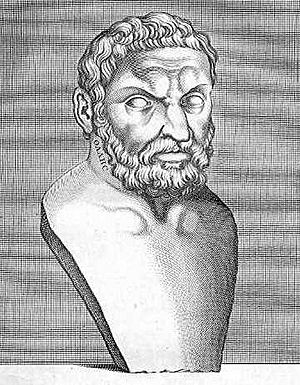Thales facts for kids
Quick facts for kids
Thales of Miletos (Θαλής ο Μιλήσιος)
|
|
|---|---|

Thales
|
|
| School | Ionian Philosophy, Milesian school, Naturalism |
|
Main interests
|
Ethics, Metaphysics, Mathematics, Astronomy |
|
Notable ideas
|
Water is the physis, Thales' theorem |
|
Influenced
|
|
Thales of Miletus, about 624 BC – 546 BC, was a pre-Socratic Greek philosopher. He was from Miletus in Asia Minor. Many, notably Aristotle, regard him as the first philosopher in the Greek tradition.
According to Bertrand Russell, "Western philosophy begins with Thales". Thales attempted to explain natural phenomena without reference to mythology and was tremendously influential in this respect. Almost all of the other pre-Socratic philosophers follow him in attempting to provide an explanation of ultimate substance, change, and the existence of the world—without reference to mythology. Those philosophers were also influential, and eventually Thales' rejection of mythological explanations became an essential idea for science. He was also the first to define general principles and set forth hypotheses. As a result he has been called the "Father of Science", though maybe Democritus is more deserving of this title.
In mathematics, Thales used geometry to solve problems such as calculating the height of pyramids and the distance of ships from the shore. He is the first known individual to whom a mathematical discovery has been attributed. Also, Thales was the first person known to have studied electricity.
Images for kids
-
Thales (Electricity), sculpture from "The Progress of Railroading" (1908), main facade of Union Station (Washington, DC)
See also
 In Spanish: Tales de Mileto para niños
In Spanish: Tales de Mileto para niños








